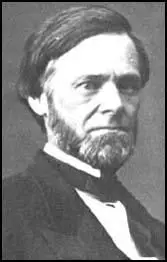John Sherman

John Sherman was born in Lancaster, Ohio, on 10th May, 1823. The brother of William Sherman, he left school to work as an engineer on canal projects. He returned to his studies and eventually was admitted to the bar in 1844. Sherman worked as a lawyer in Mansfield, Ohio and Cleveland, Ohio.
A member of the Republican Party, Sherman was elected to the House of Representatives (4th March, 1855 to 21st March, 1861) and served as chairman of the Ways and Means Committee. In 1861 he was elected to the Senate as replacement for Salmon Chase. He remained in Congress for the next sixteen years until President Rutherhood Hayes appointed him secretary of the treasury (1877-81).
Sherman returned to the Senate (1881-97) and was responsible for the Sherman Anti-Trust Act in 1890. The legislation attempted to curb the growth of monopolies. The act declared illegal any business combination that sought to restrain trade or commerce. Penalties for violation of the act included a $5,000 fine or/and a year's imprisonment
President William McKinley appointed him secretary of state in 1897 but he resigned the following year because he opposed the administration's decision to go to war with Spain. John Sherman died in Washington on 22nd October, 1900.
Primary Sources
(1) John Sherman, letter to William Sherman (January, 1861)
How can we avert a calamity at which humanity and civilization shudder? I know no way but to cling to the government framed by our fathers, to administer it in a spirit of kindness but, in all cases, without partiality to enforce the laws. No state can release us from the duty of obeying the laws. The ordinance or act of a state is no defense for treason, nor does it lessen the moral guilt of that crime. Let us cling to each other in the hope that our differences will pass away, as they often have in times past. For the sake of peace, for the love of civil liberty, for the honor of our name, our race, our religion, let us preserve the union, loving it better as the clouds grow darker.
(2) John Sherman, letter to William Sherman (10th November, 1865)
I have seen Johnson several times. He seems kind and patient with all the terrible responsibility. I think he feels what everyone must have observed, that the people will not trust the party or men who, during the war, sided with the Rebels. The Democratic Party is doomed forever as a disloyal organization, and no promises, or pledges, or platform they can make will redeem them from the odium they justly gained.
